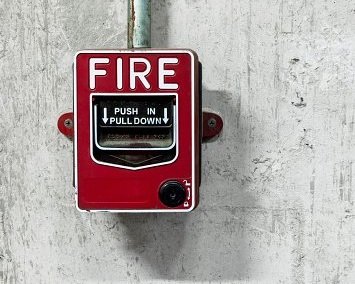What Is a Fire Alarm System & Why Is It Important?
Fire alarms are an essential feature of any commercial or residential space. Although commonly found, many individuals are unclear about how these systems operate. At LMC, we believe in the importance of understanding the ins and outs of your alarm system. To help you better respond in case of an emergency, here are the four main functions of a fire alarm system.
Function #1: Detecting Fire:
Awareness is the first step in accurately responding to a fire emergency. Alarm systems are your first line of defense, as they are programmed to monitor smoke, heat, and water movement from fire sprinklers to detect a fire. While most people believe smoke activates fire sprinklers, it is, in fact, high heat that triggers a sprinkler system. As hot air from the fire rises and spreads along the ceiling, it causes a glycerin-based liquid inside a glass bulb to expand and shatter. Once the bulb breaks, the sprinkler head is exposed, and pressurized water flows out. In the industry, we call this process “Fusing.”
Function #2: Alerting Occupants
Once a fire is detected, a fire alarm system will use visual and audible signals to notify the building’s occupants of the threat. Alarms are loud and aggressive to ensure they don’t go unnoticed and that people can swiftly and safely evacuate the building. However, if an employee or occupant detects a fire before the system, fire alarms contain pull stations that allow individuals to trigger the alarm manually.
Function #3: Managing Risks
Additionally, fire alarm systems are equipped with control measures. The alarms activate these features — mitigating risk by initiating necessary actions to protect occupants and prevent fire and smoke from spreading. For example, when triggered, fire alarm systems can automatically shut doors in different zones, power off ventilation and air conditioning systems, as well as shut off or redirect elevators to designated levels. These simple acts can make a world of difference in minimizing damages and preventing injury to employees, customers, or residents.
Function #4: Notifying Authorities
Lastly, fire alarm systems protect you by automatically notifying the authorities and local fire department to ensure help arrives on the scene as soon as possible. Alarm systems are also designed to supervise overall system function and notify you when routine maintenance is required so that you can be confident your system will work when it matters most.
LMC is Ready to Help
If you're in the DFW area and looking to implement or update a fire alarm system, LMC Fire and Safety is here to provide first-rate full-service fire alarm system installation and maintenance.
With decades of experience, our team handles everything. We'll start by helping you choose the best fire alarm system for your building and industry. Then, after installation, we'll train your staff and residents on proper use and conduct ongoing maintenance and inspections to ensure your system meets all code regulations and inspection requirements.
Contact us today so you can remove the worry of a faulty fire alarm system.





